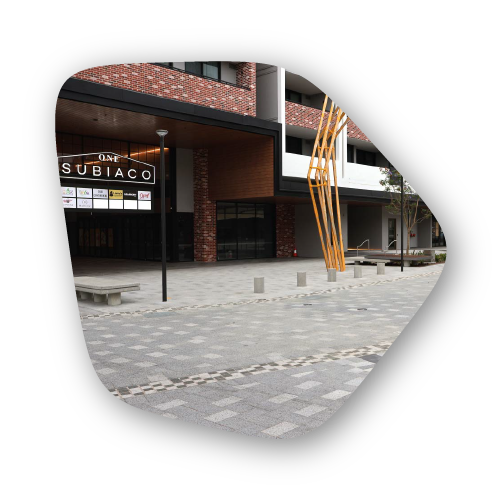
Australia's Harsh Climate: A Silent Threat to Your Paving Investment
Australia is famous for its sun, sand, and stunning outdoor spaces — but those same environmental factors can be merciless to unsealed paving. Whether you’re managing a commercial plaza, industrial yard, or residential development, the Australian climate is not kind to exposed surfaces.
Extreme UV radiation, relentless heat, torrential rain, and mineral-heavy water all work in tandem to break down pavers over time. What begins as subtle discolouration or minor surface roughness can quickly escalate into major structural deterioration.
It’s not a matter of if it will happen — it’s a matter of when.
Without proper sealing, your paving investment is living on borrowed time.
The Unseen Enemies of Unsealed Pavers
When you walk across a freshly laid paved area, everything looks solid and permanent. But beneath the surface, the paving materials are quietly under attack. Unsealed pavers are porous — meaning they absorb moisture, oils, and contaminants like a sponge. Over time, this infiltration creates a chain reaction of decay.
1. Moisture Infiltration and Freeze Damage
Even in Australia’s warmer zones, moisture finds its way into the pores and joints of pavers. When temperatures drop, that water expands as it freezes, creating micro-cracks that gradually widen. Before long, your once-smooth surface begins to crumble and pit.
2. Stains and Chemical Corrosion
From oil leaks in car parks to acidic rain and cleaning chemicals, unsealed pavers absorb everything they touch. The result? Deep-set stains, efflorescence, and corrosive erosion that can’t be removed by surface cleaning.
3. UV Breakdown
Australia’s UV levels are among the highest in the world. Constant sun exposure fades colours, weakens surface bonds, and leaves pavers looking dull, patchy, and prematurely aged.
4. Mould, Algae, and Slippery Growths
In shaded or damp areas, moisture trapped inside the pavers encourages mould and algae growth. Not only does this create unsightly green stains — it also creates dangerous slip hazards for pedestrians and staff.
Unsealed pavers become a liability. A simple rainstorm can turn a walkway into an insurance risk.
The Cost of Neglect: When Maintenance Becomes Reconstruction
Too many property and project managers make the same mistake — assuming that because pavers are “low-maintenance,” they’re “no-maintenance.” Unfortunately, that assumption can cost thousands.
When pavers begin to deteriorate, the damage doesn’t stop at the surface. Moisture can reach the bedding layer, destabilising the foundation. Weeds push through weakened joints, pavers shift, and before you know it, the entire area becomes uneven and unsafe.
At that stage, sealing is no longer enough. You’re looking at complete resurfacing or replacement — and that can easily cost three to five times more than proper sealing and periodic upkeep.
Ignoring sealing isn’t just a maintenance oversight. It’s a financial trap.
Sealing: Your First Line of Defence Against Australian Conditions
A high-quality sealant forms an invisible protective barrier over your Perth pavers — locking out moisture, blocking stains, and reflecting UV damage. It’s the single most effective step you can take to extend the life of your investment.
Moisture Protection
Sealing prevents water from entering pores and joints, reducing cracking, efflorescence, and mould growth.
Colour Retention
Sealants act like sunscreen for your pavers, preserving the rich tones and finishes that make your outdoor spaces look professional and polished.
Stain Resistance
Oil, grease, and contaminants stay on the surface where they can be cleaned off easily — rather than seeping in permanently.
Improved Safety
By reducing mould and algae growth, sealed surfaces stay cleaner and less slippery underfoot — protecting workers, visitors, and clients alike.
In short: sealing doesn’t just protect your pavers — it protects your reputation, your bottom line, and your compliance obligations.
The Australian Challenge: Why Sealing Matters More Here Than Anywhere Else
Let’s face it — Australia’s environment is brutal on construction materials. Between scorching UV radiation, high humidity in coastal regions, and red dust in the interior, no other country presents quite the same challenge.
Commercial pavers in particular face daily abuse — forklifts, delivery trucks, heavy foot traffic, and exposure to oil, salt, and rain. Without sealing, the surface integrity is constantly compromised. Even the toughest concrete or stone can’t stand up to years of exposure unprotected.
Many business owners only realise this when it’s too late. The surface has faded, the joints are loose, and the damage is irreversible.
A proper sealing schedule — typically every 2–3 years depending on traffic — ensures your paved areas remain structurally sound and visually impressive. It’s the simplest, most cost-effective way to outsmart Australia’s climate.
Warning Signs You’ve Waited Too Long
Without proper sealing, your paving investment is living on borrowed time.
- Dark patches or stains that don’t wash away
- Faded or chalky surfaces
- Mould or green discolouration in shaded areas
- Uneven joints or shifting pavers
- Crumbling edges or fine cracks appearing on the surface
At this stage, sealing will slow the decay — but it won’t reverse it. The sooner you act, the better your chances of saving the surface before replacement becomes inevitable.
The Australian Challenge: Why Sealing Matters More Here Than Anywhere Else
Protecting your paved assets doesn’t need to be complicated. A smart paver maintenance plan keeps everything in check:
- Regular Cleaning – Remove dirt, oil, and organic buildup every few months.
- Inspection After Rain – Check for ponding water or shifting joints.
- Reseal Every 2–3 Years – Especially after high-traffic or pressure-cleaning events.
- Use Professional Sealants – Choose industrial-grade products designed for Australian UV and moisture conditions.
- Avoid Harsh Chemicals – Stick to neutral cleaners that won’t degrade the seal.
A Word of Warning: Prevention Is Always Cheaper Than Cure
You wouldn’t leave steel unpainted in the rain, or concrete unreinforced under heavy loads — so why leave your pavers unsealed in Australia’s climate?
For commercial projects, unsealed pavers aren’t just an aesthetic risk — they’re a ticking time bomb. Once moisture, UV, and contamination have done their damage, no sealant can undo it.
Don’t wait for your surface to fail before you act. Sealing isn’t an optional upgrade — it’s essential protection against the inevitable.
Final Thoughts
Australia’s climate doesn’t forgive negligence on your paving investment. Sun, rain, and time will erode even the best paving products if left unprotected. For business and commercial project managers, sealing your pavers is more than maintenance — it’s risk management.
Act now. Protect your investment before the damage sets in — because once your pavers start to fail, it’s already too late.
Contact us to learn more about paver maintenance, or if you have any questions about what else we offer!
Looking for high-quality Perth pavers and expert guidance? Bonita Stone is your trusted paver provider, offering durable materials, professional installation, and tailored solutions to create driveways that are stylish, functional, and long-lasting. Explore our range today and find the perfect pavers to elevate your home’s exterior.






